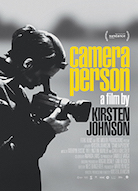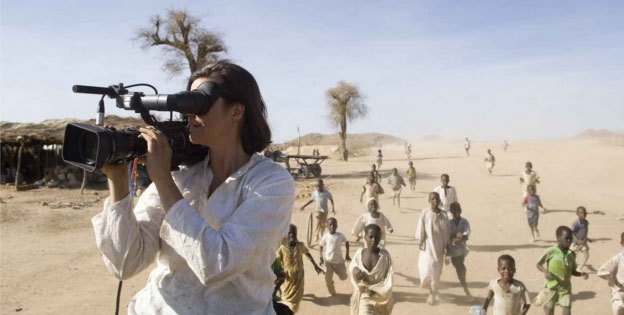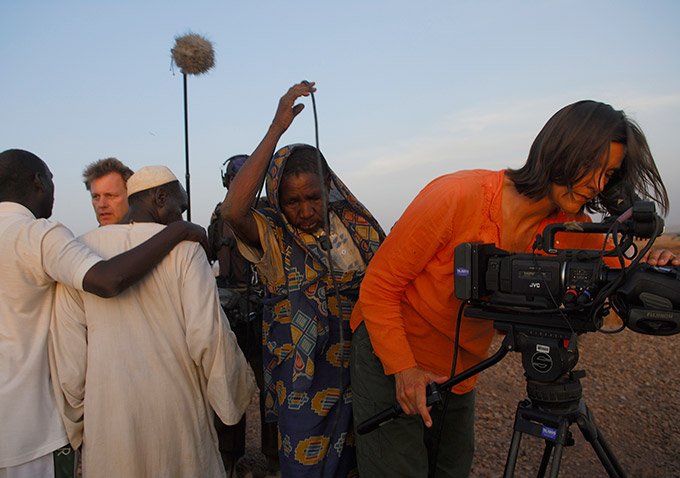Doc Corner: 'Cameraperson' is Simply Extraordinary
 Tuesday, September 6, 2016 at 10:30AM
Tuesday, September 6, 2016 at 10:30AM Glenn here. Each Tuesday bringing you reviews of documentaries from theatres, festivals and on demand.
 Cameraperson is the most extraordinary of documentaries. A compelling first-person visual memoir that intricately weaves some 15 years of filmmaking into a remarkably watchable cinematic patchwork quilt. A truly wondrous mix-tape that finds documentary cinematographer Kirsten Johnson taking directorial duties upon herself in the creation of a film about the creation of films. She utilizes b-roll footage, outtakes, and home movies to build, as if like free-form lego, a powerful portrait of not just herself, but the world we live in. Cameraperson is without a doubt the best documentary of 2016, and just maybe the best film of the year, period.
Cameraperson is the most extraordinary of documentaries. A compelling first-person visual memoir that intricately weaves some 15 years of filmmaking into a remarkably watchable cinematic patchwork quilt. A truly wondrous mix-tape that finds documentary cinematographer Kirsten Johnson taking directorial duties upon herself in the creation of a film about the creation of films. She utilizes b-roll footage, outtakes, and home movies to build, as if like free-form lego, a powerful portrait of not just herself, but the world we live in. Cameraperson is without a doubt the best documentary of 2016, and just maybe the best film of the year, period.
You have surely seen some of the films that Johnson has used footage from. Popular titles like Fahrenheit 9/11 and Citizenfour from Johnson's frequent collaborator Laura Poitras, the latter of which makes a wonderfully obscure and unexplained appearance yet which only proves how impressively that doc was filmed. We’ve even reviewed some of them right here at The Film Experience like Dawn Porter’s Trapped, which was the very first title we reviewed in the Doc Corner.

No matter how many of the 24 titles Johnson draws from that you have seen, you haven’t seen them like this. And any that you haven't will no doubt rocket to the top of your must watch pile...
Not that Johnson makes it easy by not using title cards. Still, when assembled the way that they have been by editor Nels Bangerter, they take on a new life as if each new scene is somehow speaking to what came before it. Sequences filmed in Nigeria, Bosnia and Herzegovina and Brooklyn would seemingly have nothing in common, but when placed side by side seemingly at random they offer a snapshot of the world that is as affecting as it is unexpected. Often funny, frequently tragic, the scope of each individual locale is stripped of context and offered up to the viewer without comment and often raise questions of documentarians and what they choose to include and how what is put in or left out can give otherwise non-fiction its own inorganic shaping. New footage of Johnson with her twin children (their father Ira Sachs does not appear) and more with her ill mother only add to this.
We recently spoke about Kate Plays Christine and the way that film manipulates its narrative to question the procedures of documentary filmmaking. Cameraperson plays in a similar sandbox, although obviously does so in a different way. Alongside everything that Johnson is doing in terms of showing her journey through film, charting the world through her camera, and using film as a means of displaying the world for the complicated place that it is, the film more plainly and simply makes its audience pay attention to the how and the why of documentary filmmaking.

All too often the craft of non-fiction filmmaking is ignored. Whether that’s by audiences or, more frustratingly, by critics who instead focus on the subject rather than the filmmaking. In Cameraperson it is impossible to ignore, however, as Johnson very deliberately includes sequences that ask the audience to consider why a camera is placed where it is, what goes into crafting a shot, and how they go about filming. People will dedicate paragraph after paragraph about the cinematography of a fiction film – devoting passages to how it is lit, why the camera moves where it movies, and the arduous lengths taken to achieve a perfect shot. While Johnson’s cinematography is hardly Lubezki in that sense, her film smartly attempts to explain why it is just as important for documentaries. From the simple act of removing weeds from a ground-level shot, to discussions with a director over the levels of smog in an establishing shot. It’s one of the great achievements of Johnson’s film that the simple art of a documentary is given centre stage. It’s just one virtue of many in an incredible work of cinema.
Release: Opens this week in NY, probably expanding very slowly.
Oscar Chances: Obviously I wish it would, but it’s very atypical of what the Academy consider a documentary. Still, it could prove a surprise over awards season, which would boost its profile immeasurably.




Reader Comments (1)
this sounds fascinating. especially for those of us who love movies about movies